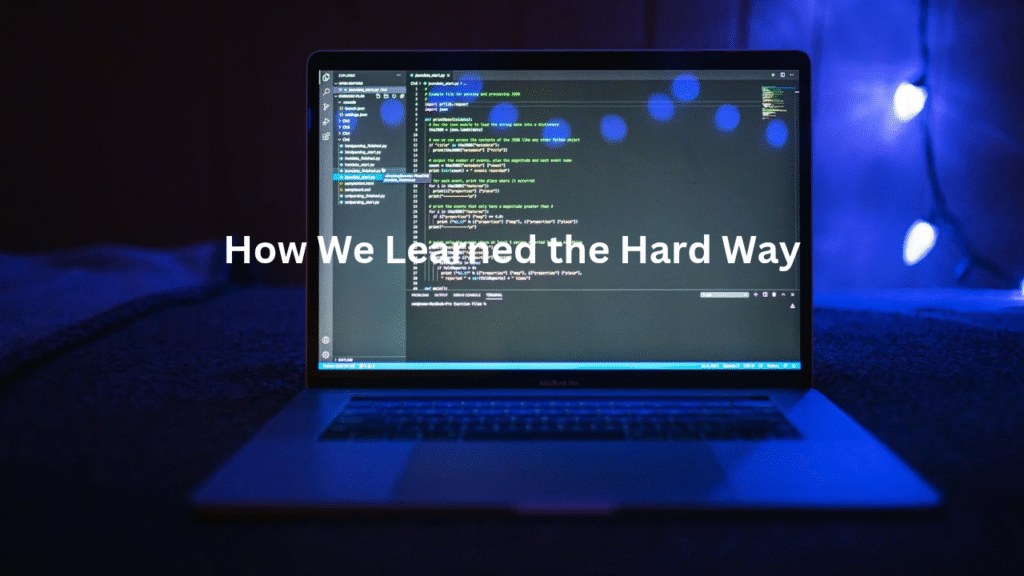
When we first started writing code in C, we felt really confused and frustrated.
Sometimes, a loop would never stop running, or a number would suddenly turn into a strange negative value. It’s a rite of passage and a warning. In systems-level programming, every bit matters.
That’s why when a number goes over its limit or drops too low, it can lead to big trouble, like a hidden bug or even a serious security problem.
Yet we’ve also seen developers, ourselves included, put too much trust in the hardware or compiler, assuming “it just works.”
It doesn’t. Preventing these failures is not just about avoiding a few dangerous edge cases. It’s about establishing a culture of control, auditability, and clarity in numerical logic.
Key Takeaway
- Integer overflow and underflow are not just math errors, they’re entry points for bugs, vulnerabilities, and failures.
- Always check boundaries before performing arithmetic, especially with user-supplied or external data.
- Unsigned types don’t throw errors they wrap. Use them cautiously.
Understanding Overflow and Underflow
Integer Overflow occurs when a number exceeds the maximum value representable by its data type.
For example, if an int32_t number gets bigger than 2,147,483,647, it doesn’t stop or crash.
Instead, it jumps back to a negative number because of the way computers handle big numbers.
Integer underflow is the opposite, it happens when a number gets too small.
For example, if you try to take 1 away from an unsigned number that’s already 0, it jumps to the biggest number it can hold.
Here’s a simplified example:
unsigned int a = 0;
a -= 1; // underflow: a becomes UINT_MAX
And another:
int b = INT_MAX;
b += 1; // overflow: b becomes INT_MIN (undefined behavior)
In C and C++, when a signed number gets too big, the result can be random and unsafe.
But if an unsigned number gets too big, it wraps around to zero or a small number is still risky if you’re not careful.
How We Learned the Hard Way

One of our embedded projects for an IoT sensor network taught us a painful lesson. The code was meant to keep track of temperature readings in an unsigned 8-bit counter. (1)
It worked fine, until the 256th reading. Suddenly, our “average” calculation went haywire. The culprit? A silent underflow in a subtraction where the lower bound wasn’t checked.
We didn’t catch it until the device failed on the field.
That problem changed the way we handle numbers. Now, we always check if values are safe, set limits early, and make sure we understand how big or small each type of number can be.
Best Practices for Preventing Overflow and Underflow
Credit by CodeVault
Know Your Data Type Limits
Use constants from <limits.h> and <stdint.h>:
#include <limits.h>
#include <stdint.h>
if (val > INT_MAX – offset) {
// prevent overflow
}
This simple check can mean the difference between safe execution and undefined behavior.
Favor Unsigned Arithmetic with Caution
We often see newcomers use unsigned int thinking it’s “safer.” But unsigned integers can underflow silently:
unsigned int a = 3;
a -= 5; // a becomes large positive number
That’s why we only use unsigned numbers when it makes sense, like for counting or working with bits. (2)
And we always double-check before taking anything away, so we don’t run into problems.
Add Pre-Operation Checks
We implement range checks before performing any arithmetic:
if (a > 0 && b > INT_MAX – a) {
// overflow would occur
} else {
int c = a + b;
}
For subtraction:
if (a < b) {
// underflow
} else {
int c = a – b;
}
These patterns are baked into our habits now.
Use Safer Casts and Promote Carefully
Implicit promotion can sometimes lead to bugs. For instance, mixing signed and unsigned types can cause misleading results:
int a = -1;
unsigned int b = 10;
if (a < b) {
// warning: a is promoted to unsigned, now huge value
}
Always double-check expressions with mixed types. When necessary, use explicit casting and static analysis to detect mismatches.
Leverage Compiler Warnings and Sanitizers
We’ve found that enabling aggressive warnings helps immensely:
-Wall -Wextra -Wconversion -fsanitize=undefined
These flags caught numerous overflow and underflow bugs during development and testing.
Isolate Arithmetic in Helper Functions
Over time, we learned to break math parts of our code into small pieces that are easier to check and test.
That way, we can mock, trace, or clamp them easily:
int safe_add(int a, int b) {
if (b > 0 && a > INT_MAX – b) return INT_MAX;
if (b < 0 && a < INT_MIN – b) return INT_MIN;
return a + b;
}
It’s a bit more verbose, but in systems where every calculation counts, this matters.
Avoid Dangerous Functions
Certain library functions don’t check for size or overflow. We avoid them, or use safer alternatives with size-limiting parameters.
For example:
- Avoid atoi, prefer strtol with error checks.
- Avoid unchecked arithmetic inside macros or inline functions.
Common Pitfalls: Where Overflows Hide
As we went through old code, we kept finding overflows, not just in hard places, but right in the middle of code that seemed totally fine.
Some of the trickiest bugs came not from bad intentions, but from small assumptions made by well-meaning developers. Here’s where we’ve seen overflows sneak in:
Loop counters
One of the most subtle issues we encountered came from unsigned loop counters.
At first glance, using an unsigned integer to count down in a loop seems safe after all, it can’t go negative, right? But that’s precisely the problem.
If you don’t set clear limits, this can cause the program to crash or run in a loop that never ends.
That’s why implementing iInteger overflow underflow prevention c cpp checks is critical in loop control logic, especially when using unsigned types.
We hit this exact issue during a review of an internal utility. The loop was intended to process up to 64 elements.
But because the loop counter was unsigned and wasn’t properly bound, it ended up iterating through gigabytes of memory before crashing.
Memory allocation
Allocating memory might sound easy, just multiply how many items you need by the size of each one, right?
But if those numbers come from a user or outside the program, the result can get too big and cause problems.
We learned this the hard way. A function we inherited took a count parameter from input and calculated count * sizeof(T) without checking for overflow.
In one test case, a large count value caused the calculation to wrap around to a small number.
To prevent issues like this, integer overflow underflow prevention c cpp checks must be placed directly around arithmetic expressions involving allocation.
These checks help make sure that memory use stays safe and that numbers don’t accidentally jump to the wrong value.
Type promotion
C’s type promotion rules are both powerful and dangerous. Mixing signed and unsigned values in an expression can produce results that are completely unexpected.
We’ve encountered bugs where comparisons like if (input < max_allowed) failed mysteriously, simply because input was signed and max_allowed was unsigned.
When input was negative, it got promoted to a large positive number before the comparison, bypassing the check altogether.
One of the key lessons from these mistakes is that integer overflow underflow prevention c cpp checks aren’t just about arithmetic overflows; they also require awareness of how types interact during promotion.
We now make it a strict practice to use consistent soundness and explicitly cast types where needed.
Assuming input is “reasonable”
This is one of the most dangerous assumptions in secure programming. When we’re building tools or applications, there’s often an implicit belief that users will interact with the system in a rational, expected way.
In one of our early internal tests, we fuzzed an input parser that assumed filenames would be short. By feeding in massive strings, we triggered an integer overflow in a length calculation that allocated a buffer to store the filename.
That experience taught us a key principle of integer overflow underflow prevention c cpp checks, never assume input is well-formed, well-sized, or even sane.
Conclusion
If you’re writing C or C++, whether it’s for firmware, games, or finance, integer overflows and underflows are hazards you can’t afford to ignore.
We’ve seen firsthand how a single unchecked addition or subtraction can ripple into a system-wide fault. Fortunately, the tools to prevent them are in your hands.
The goal isn’t to be scared of every step, but to understand what’s really happening in the computer and write code carefully.
It’s time to stop hoping our code will “just work.” We can and should write code that’s resilient by design.
Join the Secure Coding Bootcamp today and learn simple, real-world ways to write safer code.
FAQ
Q: Is using unsigned int safer than int?
Not really. Unsigned numbers don’t break the same way as signed ones, but if they go below zero, they can still cause hidden bugs that are hard to find.
Q: How can I detect overflow automatically?
Use compiler sanitizers like -fsanitize=undefined and enable warnings (-Wall -Wextra). Some modern compilers and runtime environments will trap on overflows if these are enabled.
Q: Is signed overflow always undefined behavior?
Yes. In C and C++, if a signed number gets too big, the result is called “undefined behavior.”
That means the program might act weird, crash, or even be unsafe, depending on the compiler.
Q: Should I avoid all arithmetic in C/C++?
No, just treat it carefully. Arithmetic is fundamental, but you need to anticipate and handle edge cases. Adding checks around critical operations and understanding data types goes a long way.
Q: Can I write generic overflow-safe functions?
Yes. You can write templates (in C++) or macros (in C) to wrap checks for different types. Libraries often implement these, but we’ve also built our own for maximum control.
References
- https://www.geeksforgeeks.org/cpp/how-to-avoid-integer-overflows-and-underflows-in-cpp/
- https://www.scaler.com/topics/c/overflow-and-underflow-in-c/
Related Articles
- https://securecodingpractices.com/c-secure-coding-standards-cert-sei/
- https://securecodingpractices.com/symfony-security-component-configuration-usage-basics/
- https://securecodingpractices.com/prevent-buffer-overflows-c-cpp-techniques-examples/
- https://securecodingpractices.com/secure-coding-in-c-c/

